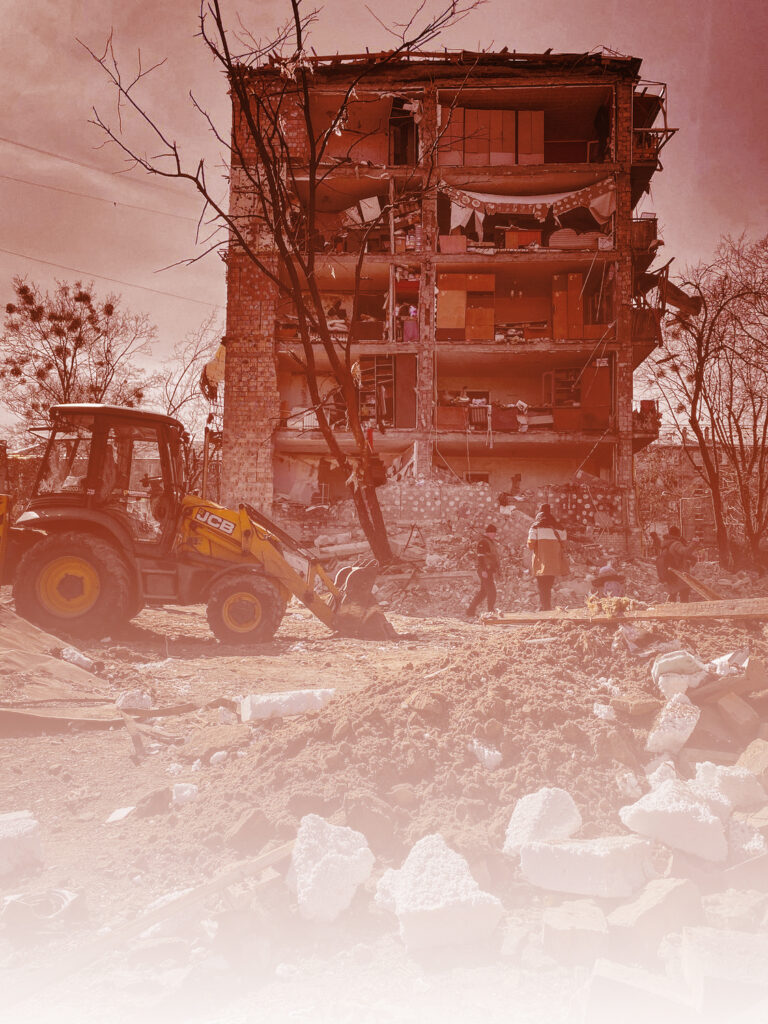CONTENTS
PREVIOUS
The Ukraine Crisis and the Building of a New International System
Table of Contents
‘The Ukraine Crisis and the Building of a New International System’ was originally published as the lead article of the June 2022 issue of Wenhua Zongheng (文化纵横). The article urges China, amid the outbreak of the Russia-Ukraine conflict, to consider the dangers of the current international system that it has been striving to integrate into and the possibilities of building a new international system.
The outbreak of the Ukraine crisis has not merely altered the geopolitical landscape, it has severely disrupted the current international order. Particularly, the imposition of extensive sanctions on Russia by the United States and other Western countries has compromised the rules of the existing international system and revealed its true, coercive nature. This crisis should provide a strong reminder to China that it must deepen its ‘worst-case scenario thinking’ (底线思维, dǐxiàn sīwéi) and seriously contemplate, as a major strategic aim, building a new international system parallel to the current Western-dominated order.
Preparing for Looming Crises
The current international system is one that is dominated by the Western countries, led by the United States, and liberal capitalist in nature. During periods when liberal capitalism functions smoothly, this system expands globally and appears to be rules-based and fair, able to include most countries and regions of the world. However, during periods of crisis, liberal capitalism will contort itself, abandoning established international rules or seeking to create new ones, exemplified by increasing nativism or deglobalisation where the hegemonic nation relinquishes its purported duties of leadership and returns to power politics.
Amidst the Ukraine crisis, the US and the Western countries have disregarded international norms by forcibly casting Russia out of the global financial architecture, namely the Society for Worldwide Interbank Financial Telecommunication (SWIFT), confiscating Russian state and personal assets, and freezing the country’s foreign exchange reserves. Such measures go far beyond the typical nonviolent means of confrontation employed by nation states such as trade wars, technology blockades, and oil embargoes, and blatantly contradicts the timeless liberal principles that ‘debts must be paid’ and ‘private property is sacrosanct’, among others. These flagrant violations of the so-called ‘rules-based order’ have laid bare the arbitrary, unlawful, and biased character of the international system and the manner in which it can be manipulated by the US and its allies to violently discipline other countries.
From the Chinese perspective, the Ukraine crisis is a warning to China that it must prepare for scenarios in which it is subject to such hostile measures. It is necessary to re-examine the present international order to grasp an accurate understanding of both its benefits and drawbacks, giving up any illusions in its fairness and long-term viability, and, whilst participating in and maximising the utility of the current system, simultaneously making preparations for the construction of a new international order.
Given the size of China, the task of national rejuvenation requires much more than an economic strategy of mere ‘domestic circulation’ (内循环, nèi xúnhuán). To achieve industrialisation and modernisation, China must engage with the world and develop a broader ‘international circulation’ (外循环, wài xúnhuán) by accessing external resources, technologies, and markets. The central task of China’s reform and opening-up policy over the past four decades has been to open the country to the outside world and participate in the global system in order to promote an international environment more favourable to the pursuit of modernisation.[1] At the same time, China has had to take necessary actions when hostile aspects of the current system have threatened the country’s fundamental interests. In the current situation, it is necessary that China, on the one hand, fights steadfastly against the manipulation of the existing system by the US and the Western countries, and, on the other hand, begins to build a new, more democratic and just global system, in partnership with developing countries.
China’s Historical Destiny Is to Stand With the Third World
The present world order has not only been shaped by China, Russia, the United States, and Europe, the countries and regions of Asia, Africa, and Latin America have also created a multitude of new regional networks amid the decline of US power. Working with other developing countries is necessary for China to strengthen efforts to build a new international system. The Belt and Road Initiative (BRI), since it was proposed by President Xi Jinping in 2013, has in fact laid the foundation for such cooperation and for the realisation of a new system.[2]
Since the People’s Republic of China was founded in 1949, the Third World has consistently provided China with new spaces to survive and grow and new sources of strength whenever it has faced pressure from superpowers, including the national liberation movements of Asia, Africa, and Latin America in the 1950s and 1960s, the Bandung Conference of 1955 and the Non-Aligned Movement, Mao Zedong’s Three Worlds theory developed in the 1970s, the emphasis on South-South cooperation during the early stages of reform and opening up in the 1980s, the establishment of the BRICS mechanism at the turn of the century, and, most recently, the development of the BRI in the last decade. Over the past 70 years, China has had adopted a wide range of foreign policies, from the ‘lean to one side’ (一边倒, yībiāndǎo) policy with the Soviet Union in the 1950s to the ‘integrating with the world’ (与国际接轨, yǔ guójì jiēguǐ) (or with the US, to be exact) policy at the turn of the century; however, China has, consciously or unconsciously, consistently turned to the Third World whenever it has felt that its independence and sovereignty were threatened.[3]
This relationship with the Third World is China’s historic destiny. Today, as China becomes an important pole in the world and is faced with the hostile containment strategy of the hegemonic United States, it cannot follow the alliance politics pursued by the US and the Soviet Union during the Cold War. Dividing the world into antagonistic blocs would drive humanity to the brink of war and global catastrophe; instead, China should continue to pursue an independent and nonaligned foreign policy, focused on bringing together the many countries of the Third World – which constitute the global majority – to foster new forms of partnership, establish new multilateral networks, and create a new international system.
Reflecting upon the practices and experiences of the BRI until now and accounting for the challenges posed by the Ukraine crisis, China’s approach towards building a new international system should be guided by the following considerations:
First, China’s orientation should be based on strategic rather than commercial interests. China cannot merely be concerned with exporting its production capacity and capital or securing access to external resources and markets for Chinese enterprises; but rather it must prioritise what is necessary to ensure strategic survival and national development. By adopting such a strategic perspective, it becomes clear that the approach taken by many Chinese firms and local governments towards other nations and regions, as part of the BRI, is not sustainable as it has prioritised commercial interests and tended to ignore political-strategic interests.[4]
Second, the creation of the new international system requires the development of a new vision, philosophy, and ideology to guide and inspire efforts to build it. In this regard, the BRI’s principles of ‘consultation, contribution, and shared benefits’ (共商共建共享, gòngshāng gòngjiàn gòngxiǎng) are insufficient. While the United States today rallies the Western camp under the banner of ‘democracy versus authoritarianism’, China must clearly uphold the flag of peace and development, uniting and leading the vast developing world whilst appealing to and persuading more European states to join this cause. President Xi Jinping’s global call for the ‘building of a community with a shared future for humanity’ (人类命运共同体, rénlèi mìngyùn gòngtóngtǐ) should be adapted to the new international situation. The Chinese concept of ‘common prosperity and common development’ should be shared with the world and promoted as a core value in building a new international system.
Third, a ‘Development International’ (发展国际, fāzhǎn guójì) should be set up as an institutional entity to create a new global system. Unlike the Western alliance mechanisms, such as the Group of Seven (G7) and North Atlantic Treaty Organisation (NATO) which are dominated by a minority of wealthy countries, a new global system must address the fundamental issue that the overwhelming majority of the world faces: how developing countries can be more effectively organised under the principle of nonalignment. Loosely organised and nonbinding initiatives such as conferences and declarations are wholly inadequate for this task; an institutional mechanism such as a ‘Development International’ should be promoted and constructed to drive more powerful organisational action and to develop networks of knowledge and culture, of media and communication, of economic cooperation, as well as other projects. In a nutshell, forms of organisational action under the mandate of peace and development should be established and experimented with.
The Relationship Between the Two Systems
Building a new system does not mean abandoning the present one.
In the forty years of reform and opening up, China’s direction and goal have been to integrate into the existing international order. As a latecomer to industrialisation and modernisation, China has had no choice but to learn from the Western countries and take in their advanced knowledge and experience. Breaking away from this system would inevitably drive China back to the old road of the ‘closed-door’ (闭关锁国, bìguānsuǒguó) policy of the 1960s and 1970s, cutting the country off from the advanced economies of the present world.[5]
Nowadays, China has travelled a long way down the road of globalisation and has benefited from it; reform and opening up has become bound up with the Chinese people’s basic interests. For this reason, it is neither desirable nor feasible to give up the benefits derived from participating in the current system.
But this by no means negates the urgent necessity of preparing for the threat of the US-led Western alliance sabotaging the present global system. The development of a new international system and the active participation in the present system are two processes that can be implemented simultaneously without conflict, in which the two systems are bound to overlap and interpenetrate each other. When the quantitative changes accumulated by the new system begin to transform into qualitative changes, a brand-new world order will naturally emerge.
Author’s Notes
1. ‘Reform and opening-up’ refers to the era of China’s economic reform initiated in 1978 under the leadership of Deng Xiaoping. ↑
2. The Belt and Road Initiative (BRI) is a global infrastructure development project proposed by China’s President Xi Jinping in 2013. By the end of July 2022, China had signed more than 200 BRI cooperation agreements with 149 countries and 32 international organisations. ↑
3. In the early years after its founding, the People’s Republic of China adopted a ‘lean to one side’ foreign policy which declared that the country would ally with other socialist countries against the forces of imperialism. Meanwhile, during the 1990s and 2000s, China pursued a policy of ‘integrating with the world’, increasing its global political and economic engagement. In particular, China and the United States deepened their economic interdependence; in 2000, the US granted China permanent normal trade relations status and, the following year, China became a member of the World Trade Organisation. ↑
4. Along with the central government and firms, China’s provincial and municipal governments are also important actors in the BRI. ↑
5. The term ‘closed-door’ refers to the policy of the Ming Dynasty (1368–1644) and early Qing Dynasty (1644–1911) of limiting China’s economic, scientific, and cultural interactions with the world, which contributed to the country falling behind the Western industrialised nations. ↑







